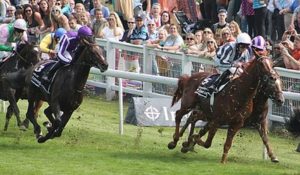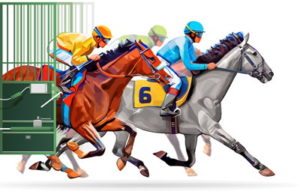 When it comes to horse racing winnings, there is actually more to consider than you would think with a number of different factors in play. For horse races, the collective term for the winnings and, as such the money that is paid out, is called the ‘purse’.
When it comes to horse racing winnings, there is actually more to consider than you would think with a number of different factors in play. For horse races, the collective term for the winnings and, as such the money that is paid out, is called the ‘purse’.
The purse covers quite a few entities when it comes to who it is paid out to, with many groups of people often entitled to a cut.
Horse racing is a particularly lucrative market in the UK, with this being many of the leading bookmaker’s major revenue source and as a result, they pay particular attention to trying to make sure that they cover this in as much detail as they can.
While they are as informed as they can possibly be, in order to get an understanding of how to price races and knowing whether they have given the right odds, they also rely heavily on advanced technology which uses historical data to provide punters with the price.
Although overall, bookmakers appear to come out on top, there are also a number of anomalies that occur that catch them out, such as a horse winning with long odds and someone betting a huge amount of money on this event happening. These are usually people who are really in the know and could well be linked with the horse itself.
How horse racing winnings are split is something that many people, especially those associated with the sport often wonder. For example, anyone who benefits from a successful bet will often be happy, though they might not help but think that those at the top (owner/trainer) have really reaped the rewards.
The Division of Winnings
 Let’s take a look at how horse racing winnings, in the UK at least are split, who gets what and whether there is anyone else apart from the obvious who benefits. In a horse race, the usual beneficiaries of the winnings in terms of places are those who finish in first, second, and third who all share the total purse of what was staked.
Let’s take a look at how horse racing winnings, in the UK at least are split, who gets what and whether there is anyone else apart from the obvious who benefits. In a horse race, the usual beneficiaries of the winnings in terms of places are those who finish in first, second, and third who all share the total purse of what was staked.
Starting with first place, it is the owner (obviously), who benefits the most with 49.6 percent of the total purse going to them. The trainers receive 5.89 percent of the total purse, the jockeys get 4.33 percent of the total purse, while the stable gets 2.95 percent of the total purse.
For second place, the owner gets 20.27 percent of the total purse, the trainer of second place receives 1.31 percent of the total purse, the jockey who finishes second takes home 0.96 percent of the total purse, while the stable of the second placed horse gets 1.2 percent.
Those who are associated with a third place finish is divided like so. The owner gets 10.13 percent, the trainers receive 0.65 percent of the total purse, the jockeys take 0.48 percent and the stable gets 0.6 percent.
| % Of Purse | Owner | Trainer | Jockey | Stable |
|---|---|---|---|---|
| First | 49.6 | 5.89 | 4.33 | 2.95 |
| Second | 20.27 | 1.31 | 0.96 | 1.2 |
| Third | 10.13 | 0.65 | 0.48 | 0.6 |
This means that the total distribution of horse racing prize winnings read like so:
- First Place: 62.77 percent
- Second Place: 23.74 percent
- Third Place: 11.86 percent
All of these figures above add up to a total percentage of 98.37 percent, which begs the question – what about the remaining 1.63 percent and how is it distributed?
Well, this is broken down below:
- Industry Training: 0.58%.
- Jockey Valet’s Attendance: 0.2%.
- PJA Pension Fund: 0.6%.
- NASS: 0.25%.
Interestingly, what is also worth noting, is that the trainers of the horses make the majority of their money from training fees instead of prizes, however, the most successful ones do still earn a considerable amount. In addition, despite claiming the majority of the purse that is on offer for a race, owners do not actually make a lot (unless they have many horses who place consistently), due to what they have to pay for such as training costs and the financial outlay for the stable.
When it comes to jockeys, while their share of the purse might be considered to be quite low, it is also worth taking into account that they also receive appearance fees for each race, so not all of what a jockey makes is from winnings.
Growth In Racing Prize Money

Financially speaking, it seems that there will always be a market for horse racing, especially with it being one of the most popular sporting betting events in the UK, and by extension around the world, while UK horse racing itself also receives a great deal of interest and wagers from outside of the country.
The 2015 horse racing season, for example, was a particularly profitable one being up by six percent on its previous year with the British Horseracing Authority (BHA) announcing that there was a record amount of prize money, which totalled £130.8 million overall.
In that year, flat racing trainer Michael Appleby was the recipient of £262,000 (November to November), while jump trainer supremo Paul Nicholls blitzed his way to a staggering £1.63 million in prize money (April to April), with particular success at the discipline’s flagship event, the Cheltenham Festival.
Jockey vs Trainer
 If anything, the popularity of horse racing appears to be growing rather than dwindling, especially when there are new horses every season, with some making the step up from being foals. Furthermore, it is clear that trainers play a particularly important part in determining where the success of a horse race.
If anything, the popularity of horse racing appears to be growing rather than dwindling, especially when there are new horses every season, with some making the step up from being foals. Furthermore, it is clear that trainers play a particularly important part in determining where the success of a horse race.
There has always been a debate about whether it is the jockey or the trainer who has the most influence on the race (so by extension, the winnings), though there are a number of arguments in each one’s favour. This is especially true for example when you compare jockey Ruby Walsh and trainer Nicholls (mentioned); they frequently teamed up together to form a highly successful partnership over the years, however, each one did just as well on their own.
Nicholls always invariably has more than one horse in a race (sometimes even three) and he has been known to have two horses place frequently, which means he must have had another jockey riding apart from Walsh.
Conclusion
Whether how horse racing winnings are divided will change over the next few years remains to be seen, though it is clear to see that for those successful few (Nicholls and Walsh), there is a considerable amount to be won if you are talented.
